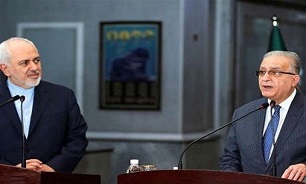Iran Not to Let Anyone Interfere in Ties with Iraq
 Speaking at a joint press conference with his Iraqi counterpart, Mohamed Ali Alhakim, in Baghdad on Sunday night, Zarif said Iran-Iraq relations are very strong and no one will be allowed to interfere in them.
Speaking at a joint press conference with his Iraqi counterpart, Mohamed Ali Alhakim, in Baghdad on Sunday night, Zarif said Iran-Iraq relations are very strong and no one will be allowed to interfere in them.
He further voiced Tehran’s support for Iraqi efforts to help Syria normalize ties with Arab countries and return Damascus to the Arab League.
The Iraqi top diplomat, for his part, said the relationship between Iraq and Iran has progressed day by day in light of the reciprocal visits by the two countries’ officials.
Alhakim also said Baghdad is resolved to boost relations with Tehran in all areas in line with efforts to serve the interests of both nations.
Heading a high-ranking Iranian delegation, Zarif arrived in Baghdad earlier on Sunday for an official visit.
The visit comes against the backdrop of Iran’s efforts to boost its foreign trade in the US sanctions era.
Iraq’s foreign minister said recently that his country is “not obliged” to abide by sanctions imposed by the US against Iran and would be pursuing options to continue bilateral trade.
On December 20, the US granted Baghdad a 90-day extension to a waiver on abiding by the sanctions that were re-imposed on the Islamic Republic in November.
Trade between the two neighboring countries is thought to amount to around $12bn, while Iran provides around 40 percent of Iraq's electricity needs.
Although Iraq faces possible censure by the US if it fails to cease its trading with Iran by the end of the waiver period, Foreign Minister Mohammed Ali al-Hakim said his country could continue relations with Iran.
“These sanctions, the siege, or what is called the embargo, these are unilateral, not international. We are not obliged (to follow) them,” he said, speaking to a gathering of journalists on January 3.
Message end/
